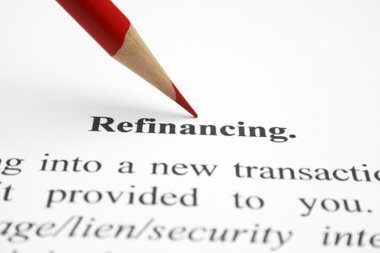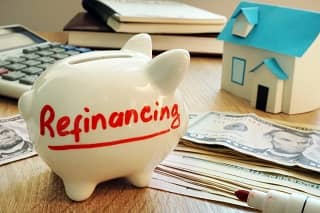 If you are age 55 or older and plan to retire in a decade or so, you need to evaluate your retirement funds and your desire to pay off your mortgage before signing that refinance application.
If you are age 55 or older and plan to retire in a decade or so, you need to evaluate your retirement funds and your desire to pay off your mortgage before signing that refinance application.
Financial planners have mixed feelings about whether homeowners should retire their mortgages before retirement.
Retirement lifestyle
"First, you need to think realistically about what you want your lifestyle to be in retirement," says Dennis McMurray, a financial adviser and principal with Bridge Wealth Management Group in Rancho Santa Margarita, California. "Do you want to stay in your home and pass it on to your heirs or do you want to sell it and downsize? Even if you are thinking of moving, maybe you want to keep it and use the property for rental income in retirement."
If you plan to sell your home within the next few years, a refinance may not make sense because you won't have time to recoup your costs.
McMurray says that while the perfect situation would be to enter retirement with plenty of savings and no debt, that's not always realistic for everyone. He says eliminating a mortgage payment before retirement can improve cash flow.
"The number one fear of people contemplating retirement is the fear of running out of money," says McMurray. "If you run through your savings and still have a mortgage, you'll be hitting a higher hurdle than someone without a mortgage."
Jude Boudreaux, a Certified Financial Planner and founder of Upperline Financial Planning in New Orleans, says that paying off your mortgage before you retire not only gives you flexibility, but also decreases the amount of money you need to fund your retirement.
However, if you are currently paying $500 or more extra every month to retire your mortgage early, you may be better off investing that money, says Joseph Adkins, CEO of Global Asset Management Group in Altamonte Springs, Florida.
"In fact, low mortgage rates give you more reason not to pay off your house because you can keep your housing payments low and may be able to get a tax deduction for the interest you pay," says Adkins.
It's worth considering that accelerating the pay off of your home -- creating more home equity at the expense of retaining or improving your financial liquidity -- can be costly, too. Should you need access to funds you've locked up in your home, you may need to take on new debt and incur monthly payments and interest cost to do so. Money in investments or savings may be more liquid and simpler or less costly to access.
Related: Retired: Should I pay off my mortgage?
Refinance into a shorter-term loan
If you are getting closer to retirement age, your natural inclination may be to refinance into a shorter-term loan in order to pay off your mortgage faster. But before you do that, there are some things to keep in mind depending on your individual circumstances.
"You should look for a lender who will offer you a loan for 10 years or even a specific term such as 11 or 12 years that matches the year you intend to retire," says Boudreaux. "But be careful to do the math and find the break-even point to determine how much you will really save. If it takes too long to recover your closing costs and transaction fees, it may not be worth it."
If you can't match the specific number of years before retirement with a new mortgage's term, you can make prepayments to make this happen. Use HSH's It's My Term prepayment calculator to find out the exact prepayment you'll need to perfectly hit your time goal.
Adkins says it rarely makes sense to refinance into a shorter-term loan for borrowers who don't have a lot of retirement savings because the higher monthly payments on a shorter loan term could further reduce the borrower's ability to save.
Extending your mortgage term
Some borrowers may want to switch to a new 30-year fixed-rate home loan in order to reduce their monthly payments.
"If you intend to invest the extra savings for your retirement, this could be a good move, especially if you use the investment to pay off your mortgage in full at a later date," says Adkins.
Boudreaux says borrowers should be wary of extending their mortgage into a new long-term loan because even with the lower interest rate, they will pay more in interest over the life of the loan. However, he says borrowers could take advantage of lower interest rates if they refinance and then continue to pay the higher mortgage payment of their current loan. This is known as a "refinance-and-prepay" strategy.
"You'll have the benefit of the lower interest rate and you'll pay off your mortgage quicker if you keep making the payments you were used to," says Boudreaux. "You also have the flexibility of the lower minimum required payments so if something happens and you need to cut back, you'll still be able to afford your loan. You won't be locked into the higher payment that is required on a shorter-term loan."
Is refinancing worth it?
Boudreaux says that if you are just a few years away from paying off your mortgage, the cost of refinancing could quickly eat up any savings. He says homeowners should avoid paying points to reduce their interest rate. In a common refinance scenario where the borrower pays no closing costs out of pocket, paying points will increase the amount of the loan or increase the interest rate a bit, and will extend the time until borrowers reach the break-even point when savings surpass the cost of refinancing.
Knowing when (or if) your refinance will save you money can help you to decide if a refinance is worth it in your situation. HSH's "Should I Refinance My Mortgage? Calculator can give you an accurate reading of when the interest savings from you new loan will overcome the cost -- and when your real savings from your refinance will actually begin.
"You should refinance only if you can significantly reduce your monthly payments and will invest those savings to generate future retirement income," says Adkins. "If you lack the discipline to save for retirement, a shorter-term loan might be a better option because it works as a forced savings plan and will build your home equity faster."
Refinance calculator - HSH'com's Tri-Refism calculator
Whether it's worth it or not to refinance -- and to what new term, and paying fees to refinance or not -- can depend on a number of factors: How much time remains on your existing mortgage, the size of the loan you'll be refinancing, your cash-flow situation now and what it is expected after you retire, what your current income and debt-load will allow you to qualify to borrow, whether you have cash available to spend on closing costs and more. How much equity you already have in your home can also come into consideration, too.
As just one example of these intersections, it may be that you have 20 years remaining on an existing 30-year term, and want to refinance to a new 10-year term to match a retirement timeline. However, even with a much lower rate than your existing loan, your monthly payment will rise, and based on today's underwriting standards, you income might not allow you to qualify for the increase in payment. Another might be a situation where, even if you could cover a higher monthly payment that a new 30-year term, with a lower rate and lower monthly payment might allow you to improve your cash flow, allowing for the faster pay down of other high-rate debt before retirement or fresh funds to plow into investments or your retirement account.
One other item to consider, most particularly if you are 62 years old or older and considering refinancing your mortgage is that a HECM or reverse mortgage could be a way to eliminate mortgage payments completely in retirement. This could factor into your decision to refinance or not, whether to take a longer or shorter term and more.
(Image: alexskopje/iStock)



